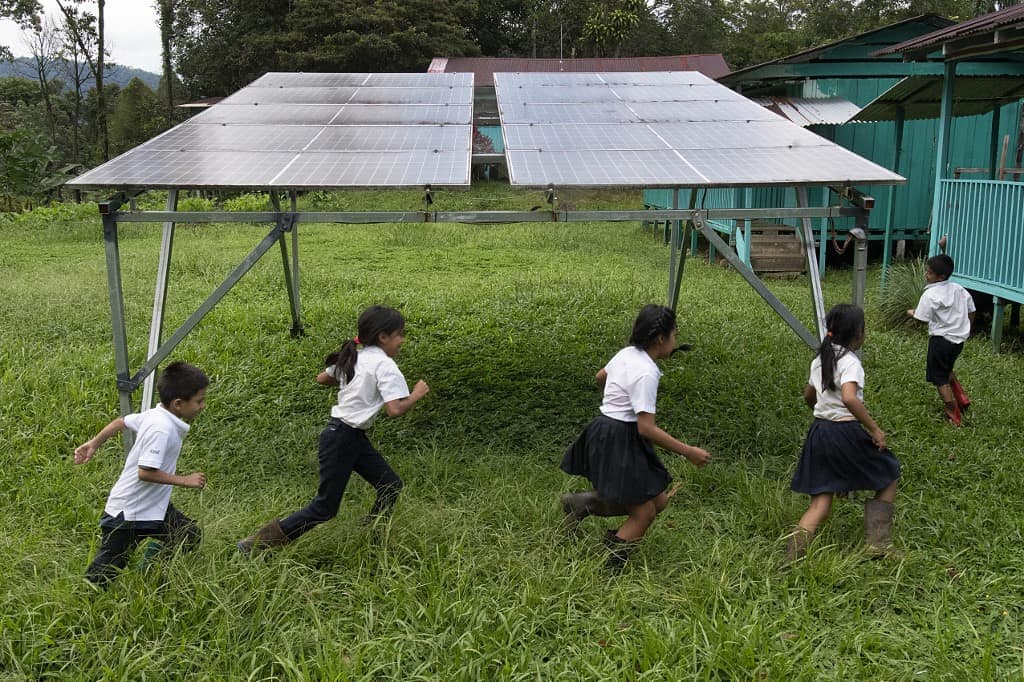In the middle of Costa Rica’s jungle, the indigenous Nairi Awari community no longer has to fetch water from the river with buckets. For the first time, they receive it in their homes thanks to solar panels that pump it from a nearby spring. The 20 families of this Cabécar indigenous community live in a mountainous area accessible only by a muddy trail that cuts through a tropical forest, four kilometers from the nearest rural road.
“Having clean water close by feels nice,” says Nelson Martínez, a member of this community located 100 km east of San José. To make this possible, they had to roll two tanks, one holding 2,500 liters and the other 7,500 liters, along the trail to install them at a nearby spring. There, the water is filtered and pumped using energy from six solar panels, each generating 450 watts.
The community’s homes still lack electricity, as the water pump consumes all the energy generated by the panels, which are installed in a clearing in the jungle. Transporting the panels was “an odyssey,” says Kenneth Solano, rural energy coordinator at the Inter-American Institute for Cooperation on Agriculture (IICA), the organization that implemented and oversees the project.
Martínez explains that previously, they had to fetch water from a nearby stream with buckets. “It was a waste of time,” he notes. “Now it’s different; we have pipes and tanks, and that helps a lot,” adds the 54-year-old man, drawing water from a faucet in his rustic home. “It makes you feel happy,” he says with a smile.
Everyone Has the Right
The water system in Nairi Awari is simple, clean, and affordable. It wasn’t installed by the government but was funded by Spanish Cooperation at a cost of $12,500. “We can meet the needs of rural communities” with “low-impact technologies,” notes Solano. Costa Rica is home to eight indigenous groups, representing 2.4% of the country’s 5.2 million people, according to official data. The Cabécar population numbers around 14,300 and occupies ancestral land covering some 151,400 hectares.
While over 92% of Costa Ricans have access to potable water, according to official statistics, the UN states that “only 40% of indigenous people have access to potable water” in this Central American nation, one of the region’s most prosperous. “Everyone has the right to have water at home,” stresses Martínez.
Source of Life
Further down the slope, in the community’s small school, about a dozen children learn to add with abacuses. A solar panel once powered the classroom and computers provided by the Ministry of Education, but it has since broken down. While they wait for someone to repair it, the children use the panel as a swing.
Teacher Viviana Hernández explains that before the water pumping system, children were at risk of stomach illnesses from drinking “dirty river water.” “Not long ago, an animal died in the water, and we didn’t even notice,” recounts the 27-year-old teacher, who is also a member of the community. “Water is our source of life,” she reflects in an interview.
But “the government hasn’t taken the initiative to come to these areas and create a system that truly works for indigenous communities,” she adds. At lunchtime, the children rush to eat rice, beans, and chicken with hearts of palm prepared by Noemí Martínez, the school and community cook, in her rustic wooden kitchen, which lacks gas.
As she washes the dishes with clean water from the faucet, the 54-year-old woman emphasizes how “nice” it is “to have water in the houses” and “not have to go far to fetch it.”






